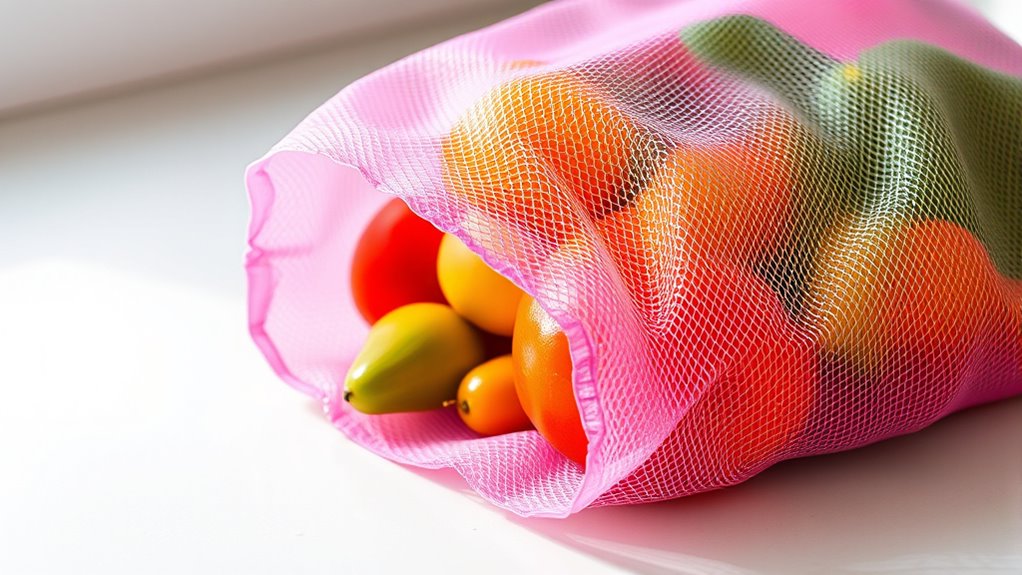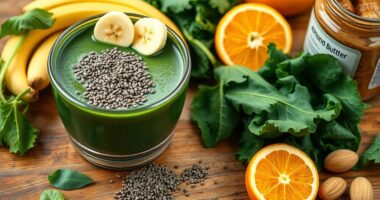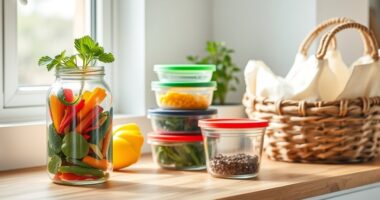Reusable produce bags can harbor bacteria and mold if you don’t clean them regularly. Dirt, food residues, and moisture can build up, leading to unsanitary conditions. To keep them hygienic, wash bags after each use with warm water and mild detergent, or soak them in vinegar solution for extra disinfection. Make sure they dry completely to prevent mold. For detailed care tips that keep your bags fresh and safe, keep exploring how to properly clean and maintain them.
Key Takeaways
- Reusable produce bags can harbor bacteria or mold if not cleaned regularly and thoroughly.
- Machine wash with warm water and mild detergent effectively removes dirt, bacteria, and odors.
- Soaking in vinegar solution can disinfect and deodorize produce bags naturally.
- Ensure bags are completely dry before storing to prevent mold growth.
- Regular cleaning after each shopping trip maintains hygiene, extends bag lifespan, and promotes sustainability.

Reusable produce bags are an eco-friendly alternative to single-use plastic bags, helping you reduce waste and minimize your environmental impact. By choosing these sustainable shopping options, you’re making a conscious effort to cut down on plastic waste and support a healthier planet. These bags serve as effective plastic alternatives, but many people wonder if they harbor bacteria and how to keep them clean. The good news is that, with proper care, reusable produce bags can stay hygienic and safe for repeated use.
One common concern is whether these fabric or mesh bags can harbor bacteria or mold, especially if they’re not cleaned regularly. The truth is, like any fabric item, they can accumulate dirt, food residues, or bacteria if left damp or dirty. However, this doesn’t mean they’re inherently unsanitary. It’s essential to wash them properly and frequently, particularly after shopping for produce like fruits and vegetables that may carry bacteria or dirt. Proper cleaning ensures they stay fresh and safe to use, reinforcing your commitment to sustainable shopping while safeguarding your health.
Washing your reusable produce bags is straightforward. Most fabric and mesh bags are machine washable, so you can toss them in with your regular laundry. Use warm water and a mild detergent to effectively remove any dirt or bacteria. For bags that are heavily soiled or have developed an odor, you might opt for an extra rinse cycle or soak them in a vinegar solution beforehand. Vinegar acts as a natural disinfectant and deodorizer, helping eliminate any lingering bacteria or smells. Avoid bleach unless specifically recommended by the manufacturer, as it can degrade certain fabrics over time.
Most produce bags are machine washable; use warm water, mild detergent, and air dry for hygiene and longevity.
Dry your produce bags thoroughly before storing them away. Air drying is usually sufficient, but if you’re in a hurry, you can tumble dry on a low setting. Ensuring they’re completely dry prevents mold growth and keeps them fresh for your next shopping trip. It’s a good habit to wash your bags regularly—after each shopping trip or at least once a week—so you’re always using clean, bacteria-free bags. This routine not only maintains hygiene but also extends the lifespan of your reusable bags, making them a reliable plastic alternative for many shopping trips to come.
Frequently Asked Questions
Are Reusable Produce Bags Bpa-Free?
You might wonder if reusable produce bags are BPA-free. Many are made from eco-friendly fabrics or non-plastic materials to address plastic concerns, but some plastic-based bags could still contain BPA or other chemicals. To avoid chemical leaching, check labels carefully and choose bags labeled BPA-free or made from natural fibers. This way, you minimize exposure to harmful substances and reduce your plastic concerns while shopping sustainably.
Can Bacteria Survive Long-Term on Fabric Bags?
Think of fabric bacteria as shadows that cling quietly in the corners of your bag. While they can survive long-term contamination, proper cleaning keeps them at bay. You should wash fabric bags regularly with hot water and soap, ensuring bacteria don’t settle in for the long haul. By doing so, you prevent long-term contamination and keep your reusable produce bags safe and fresh, just as you’d want your environment to remain clean and bright.
How Often Should I Replace Reusable Produce Bags?
You should replace your reusable produce bags when they show significant wear, tears, or fraying, which can compromise their bag durability. Regularly inspecting them helps prolong their lifespan, reducing environmental impact. While high-quality bags last longer, replacing damaged ones ensures hygiene and effectiveness. Keep in mind, using durable bags minimizes waste and supports eco-friendly habits, making timely replacements a smart choice for both health and sustainability.
Are Mesh or Cotton Produce Bags More Hygienic?
When choosing between mesh or cotton produce bags, consider hygiene and durability. Mesh bags dry faster and are easier to wash regularly, which helps maintain cleanliness. Cotton bags are sturdy but may trap more dirt, so you should wash them more often. Both materials can be hygienic if you follow proper wash frequency and guarantee thorough cleaning. Ultimately, selecting a bag that suits your wash routine and material durability helps keep your produce fresh and safe.
Do Reusable Produce Bags Need to Be Sanitized After Each Use?
You might think a quick rinse is enough, but it’s best to stay on top of cleaning frequency. Reusable produce bags do need to be sanitized after each use to keep bacteria at bay. Use effective sanitation methods like machine washing with hot water or hand washing with soap and vinegar. This way, you’re playing it safe, ensuring your bags stay fresh and hygienic for every shopping trip.
Conclusion
Now that you know reusable produce bags can harbor bacteria, it’s like inviting microscopic villains into your kitchen kingdom. But don’t panic—by washing them properly, you’re wielding a powerful shield against these invisible foes. Think of your bags as tiny fortresses that need regular cleansing to keep your fruits and veggies truly safe. With a quick wash, you’ll turn your bags from bacteria hideouts into pristine, bacteria-free warriors, ensuring your produce stays fresh and your health stays protected.










